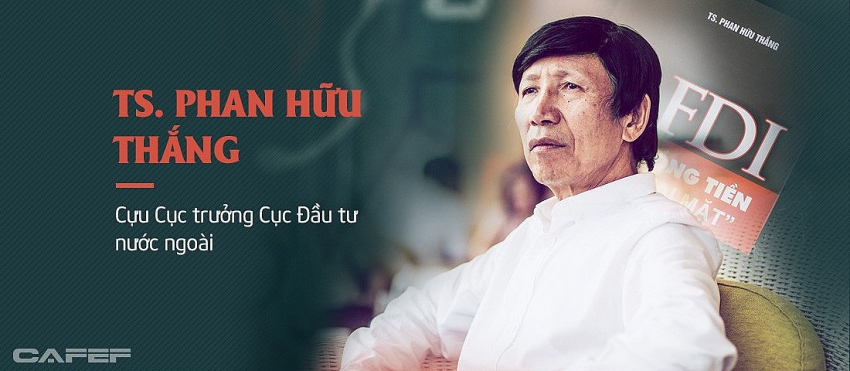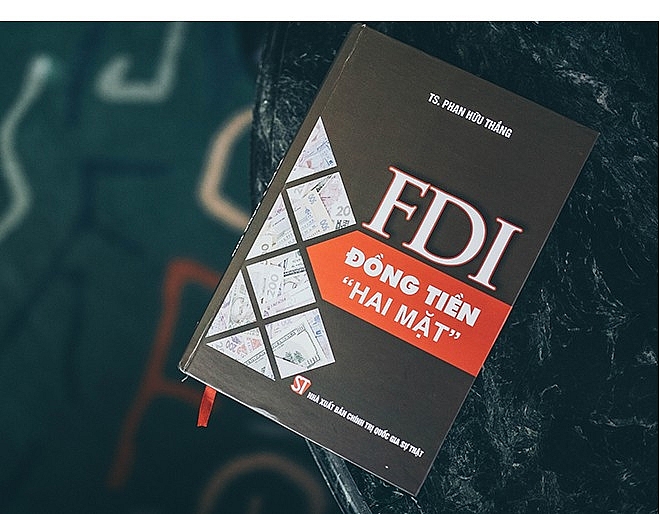Decoding the book “FDI: Double-sided coin”
 |
| Dr Phan Huu Thang, the author of “FDI: Double-sided coin” |
Foreign direct investment (FDI) is a key area of interest for numerous people, especially those working in the economic sector. However, only a few people in Vietnam command deep and comprehensive understanding of the subject, holding the requisite theoretical and practical knowledge – and Dr Phan Huu Thang is one of them. He is also one of the select few who have accompanied Vietnam throughout these three decades of attracting FDI from the very beginning.
As of now, while he is not directly involved in the management of the FIA, he still follows the FDI scene and with his experience and passion, he is currently a widely-acclaimed expert and a wellspring of knowledge and insights about FDI.
This also explains why Dr Thang has the ears of reporters who look for deep, comprehensive analysis in this sector. Several months ago, on the occasion of the 30th anniversary of attracting FDI, Thang released his book entitled “FDI: double-sided coin,” published by the National Political Publishing House of Vietnam.
The book is a collection of articles and interviews – either wrote or answered by Dr Thang – from numerous publications, addressing the attraction of FDI in the 2011-2017 period. These articles and interviews show a consistent opinion with multi-dimensional views about the pros and cons of FDI during the 30 years since the National Assembly passed the Law on Foreign Investment in 1987. These opinions are wrapped in the length of 500 pages and carry great value and relevant insights to Vietnam’s present and future.
 |
| The cover of the book “FDI: Double-sided coin” |
The book is divided into four chapters. The first chapter has 13 articles addressing the most general problems of FDI and offering a selection of relevant news about FDI attraction in 2017.
In the second chapter, Thang discusses six large problems with FDI attraction during 2011-2017, including negative environmental impacts, transfer pricing, issues with foreign investment in the real estate and tourism sector, as well as the difficulties of Vietnamese enterprises in their overseas investments.
The third chapter included articles about the state management of FDI, while the fourth chapter focuses on the results of FDI attraction during 2011-2017. The conclusion offers information about the author’s contributions to the development of FDI through the objective evaluation of reporters.
According to Thang, during the past 30 years, FDI not only improved socio-economic development, increased the usage of local resources, and generated jobs for locals, but also helped Vietnamese enterprises transfer technology, improve their management capacity, and improve the investment environment, among others.
However, the book also mentions negative impacts. Notably, technology transfer has yet to reach desired levels, while linkages between foreign and local enterprises have yet to produce the expected results and environmental pollution is also a growing concern.
Through the articles, readers can learn interesting and useful information from articles wrote in previous years which have managed to stay relevant to this day due to their insight into matters like transfer pricing, tax evasion, and the losses of foreign enterprises. Other articles supply a deep analysis of the milestones in attracting FDI during past 30-years.
One outstanding article in the book is “FDI – double-sided coin” (which also lent the book its title) in which Thang listed the eight largest achievements and the eight largest disadvantages of FDI in Vietnam. These conclusions are collected from his observations of three decades of ups and downs of the country’s FDI journey.
Professor Nguyen Mai, chairman of the Vietnam Association of Foreign-Invested Enterprises, said, “Having worked in the state apparatus managing FDI, Thang not only provides impeccable theoretical explanations, but ties in real life events to demonstrate his point. He contributed high-quality articles, which are extremely educational by summarising FDI in each five-year period, helping to complete laws and policies on more effective FDI attraction."
What the stars mean:
★ Poor ★ ★ Promising ★★★ Good ★★★★ Very good ★★★★★ Exceptional
 Tag:
Tag:
Related Contents
Latest News
More News
- FDI in Vietnam according to pundits (October 11, 2018 | 11:00)
- Taking advantage of the new era (October 10, 2018 | 15:53)
- Interest in renewables drives foreign investment surge (October 10, 2018 | 15:21)
- Bac Giang: building firm FDI foundations of industry and tourism (October 10, 2018 | 13:09)
- Vietnam’s way ahead in foreign investment and economic growth (October 10, 2018 | 11:17)
- FDI into real estate through the roof in Ho Chi Minh City (October 08, 2018 | 12:37)
- Directing FDI into large transport infrastructure projects (October 08, 2018 | 12:34)
- ESMO factory granted investment certificate (October 04, 2018 | 17:23)
- VIR awarded merits and medal for outstanding achievements in FDI attraction (October 04, 2018 | 15:36)
- Hong Kong FTA to boost investment (October 04, 2018 | 14:00)

























 Mobile Version
Mobile Version